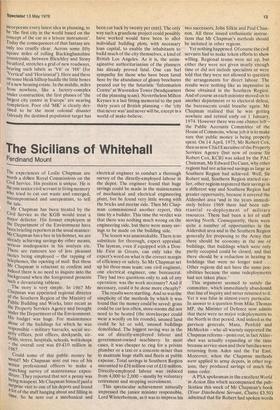The Sicilians of Whitehall
Ferdinand Mount
The experiences of Leslie Chapman are Worth a dawn Royal Commissions on the Civil Service. His position is unique. He is the one senior civil servant in living memory Who tried to cut out waste and emerged, uncompromised and unrepentant, to tell the tale.
Mr Chapman has been treated by the Civil Service as the KGB would treat a Major defector. His former employers at the Department of the Environment have been briefing reporters in the usual manner: Mr Chapman has a bee in his bonnet, we are already achieving savings by Other means, serious inadequacies in his analysis etc. There are rumours too of less pleasant tactics being employed — the tapping of _telephones, the opening of mail. But these Mr Chapman is reluctant to confirm and indeed there is no need to inquire into the background when the foreground presents such a devastating tableau. The story is very simple. In 1967 Mr Chapman was appointed regional director of the Southern Region of the Ministry of Public Building and Works, later recast as the Property Services Agency and brought under the Department of the Environment. His budget was huge. For maintenance alone of the buildings for which he was
tesPonsible — military barracks, social security offices, post offices, dockyards, airfields, stores, hospitals, schools, woikshops — the overall cost was £9410 million in 1967.
Could some of this public money be saved? Mr Chapman sent out two of his Senior professional officers to make a searching survey of maintenance expenditure. They reported that not a penny was being misspent. Mr Chapman himself paid a surprise visit to one of his depots and found u,lot of the staff hanging about and filling in tulle. So he sent out a mechanical and
electrical engineer to conduct a thorough survey of the directly-employed labour at the depot. The engineer found that huge savings could be made in the maintenance of mechanical and electrical engineering plant, but he found very little wrong with the bricks and mortar side. Then Mr Chapman commissioned another report, this time by a builder. This time the verdict was that there was nothing much wrong on the engineering side, but there were many sav ings to be made on the building side.
The lesson was unmistakable. There is no substitute for thorough, expert appraisal. The layman, even if equipped with a Double First in Greats, can only take the expert's word on what is the correct margin of efficiency or safety. So Mr Chapman set up his three-man team: one civil engineer, one electrical engineer, one bureaucrat. They had two questions only to ask of any operation: was the work necessary? And if necessary, could it be done more cheaply?
The results were startling. And so was the simplicity of the methods by which it was found that the money could be saved: grass could be cut less often, store-rooms did not need to be heated (the storekeeper could wear a woolly on his rounds), unused land could be let or sold, unused buildings demolished. The biggest saving was in the use of directly-employed labour and government-owned machinery. In most cases, it was cheaper to ring for a private plumber or a taxi or a concrete-mixer than to maintain huge staffs and fleets at public expense. Total savings in Southern Region amounted to £34 million out of £10 million. Directly-employed labour was reduced from 4,000 to 2,000 — mostly by voluntary retirement and stopping recruitment.
This spectacular achievement naturally impressed the junior minister responsible, Lord Winterbottom, as it was to impress his two successors, John Silkin and Paul Channon. All three issued enthusiastic instructions that Mr Chapman's methods should be imitated in other regions.
Yet nothing happened. Of course the civil servants had to make token efforts to show willing. Regional teams were set up, but either they were not given nearly enough time or did not include specialists or were told that they were not allowed to question the arrangements for direct labour. The results were nothing like as impressive as those obtained in the Southern Region. And of course as each minister moved on to another department or to electoral defeat, the bureaucrats could breathe again. Mr Chapman realised that he was getting nowhere and retired early on 1 January, 1974. However there was one chance left — the Public Accounts Committee of the House of Commons, whose job it is to make sure that public money is being properly spent. On 14 April, 1975, Mr Robert Cox, then as now Chief Executive of the Property Services Agency (but now of course Sir Robert Cox,_KCB) was asked by the PAC Chairman, Mr Edward Du Cann, Why other regions had not achieved savings as large as Southern Region had achieved. Well, Sir Robert said, Southern Region started earlier, other regions registered their savings in a different way and Southern Region had greater opportunity, because it covered the Aldershot area 'and in the years immediately before 1969 there had been substantial re-deployment of military resources. There had been a lot of staff moving North. Consequently, there were quite a number of opportunities in the Aldershot area and in the Southern Region generally for proposing to the Army that there should be economy in the use of buildings, that buildings which were only partly occupied could be closed, and that there should be a reduction in heating in buildings that were no longer used . . . Other regions did not have the same.possibilities because the same redeployments had not taken place.'
This argument seemed to satisfy the committee, which immediately abandoned that line of inquiry and never returned to it. Yet it was false in almost every particular. In answer to a question from Mike Thomas MP, the Minister of Defence now admits that there were no major redeployments to the North in that period. And indeed as the garrison generals, Mans, Penfold and McMeekin — who all warmly supported the Chapman reforms — point out, in fact Aldershot was actually expanding at the time because service-men and their families were returning from Aden and the Far East. Moreover, when the Chapman methods were applied to arm.y depots, in other regions, they produced savings of much the same order.
A PSA spokesman in the excellent World in Action film which accompanied the publication this week of Mr Chapman's book (Your Disobedient Servant, Chatto £3.50) admitted that Sir Robert had spoken words
which were not true but pleads that the error was understandable because Sir Robert had had to search his memory over a number of years. This plea won't wash. For it was the troops-to-the-North ,argument and only that argument which Saved the Civil Service's bacon before the PAC. It was not a trivial slip.
Mr Du Cann promises that the PAC will inquire into the cover-up. And a juicy row is in prospect. But the damage is done. The years and the money have been wasted, and will continue to be wasted so long as the present system continues.
Civil servants have months to prepare their defence before the PAC or any other parliamentary committee. MPs have at best a few hours to prepare their questions and a few minutes to ask them. The protection of the Official Secrets Act enables the civil servants to release only those pieces of evidence which favour their own case. The only answer therefore is for parliamentary committees to employ specialist prosecution counsels who would be available to cross-examine civil service witnesses in fields where MPs cannot be expected to have mastered all the technicalities. And the corollary is a Freedom of Information Act which would give Parliament and public the same access to all the information as civil servants now possess.
Why does the Civil Service behave like it does? It is surely the product of human weakness rather than of sinister malevolence or even cock-eyed ideology. Mr Chapman's diagnosis of 'the wasting sickness' is rightly based on seeing the Civil Service as a collection of individuals, each with an ego to maintain in the style to which it is accustomed. Nobody likes to feel that his work is unnecessary.
Nothing is both more significant, more exasperating and yet at the same time more poignant than the final brush-off which Mr Chapman received, just before retirement, from his immediate boss at the Department of the Environment, Mr Wardale: 'Your view was that priority should be given to maintenance economy reviews on the lines you had instituted in your Region. What is apparent is that you did not succeed in convincing your colleagues that this was necessarily the most productive approach.'
Nothing about whether the reviews worked or not. Nothing about the public good. Nothing about the truth. Mr Chapman had not succeeded in convincing his colleagues. He was thenceforward a dead duck. How clearly this conjures up the Civil Service — secretive, inward-looking, defensive, bound together by oaths of silence and loyalty, fraternal, even familial, yet ruthless and brutal to those who disobey the organisation. Now what other organisation does that suggest, I wonder?



































 Previous page
Previous page